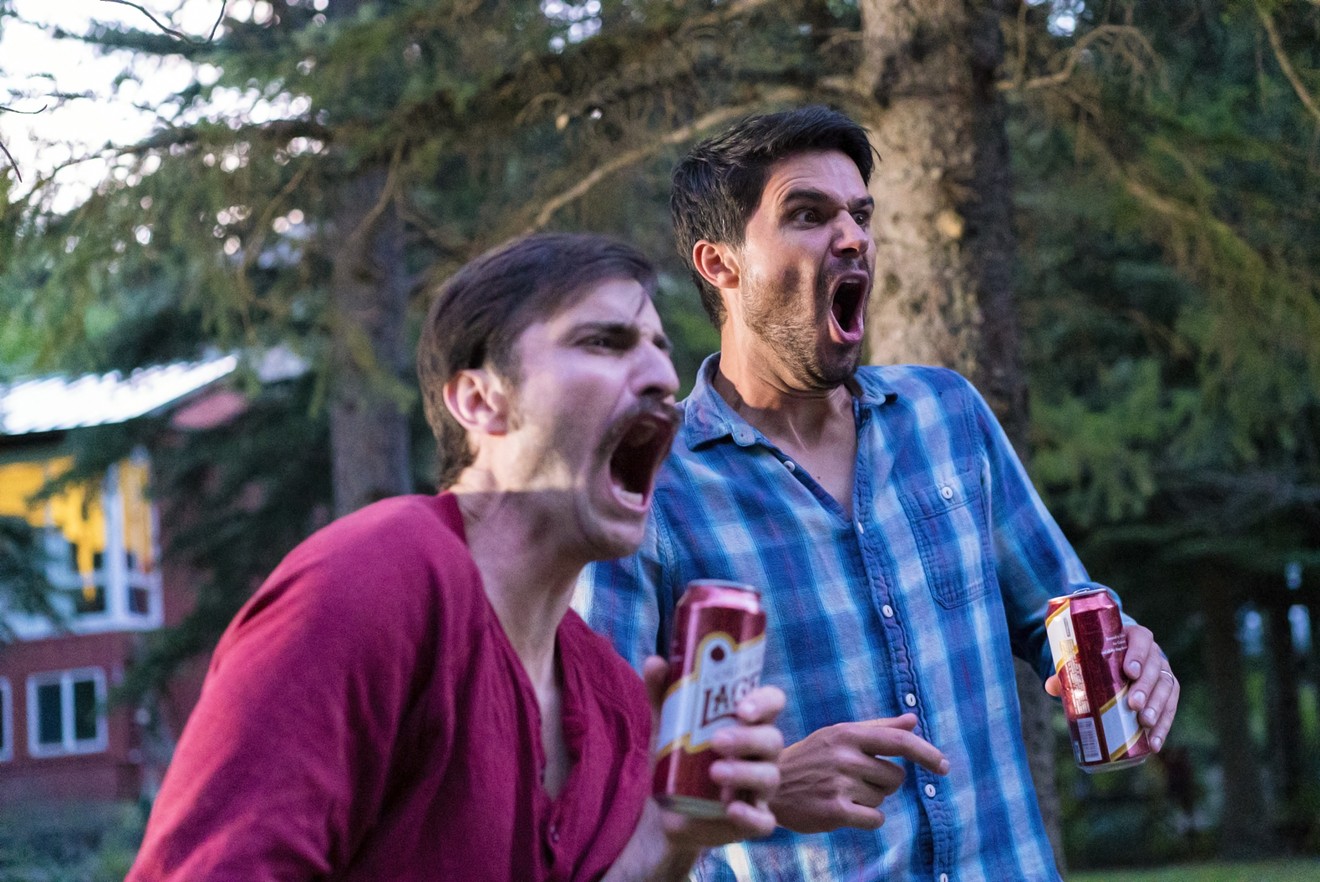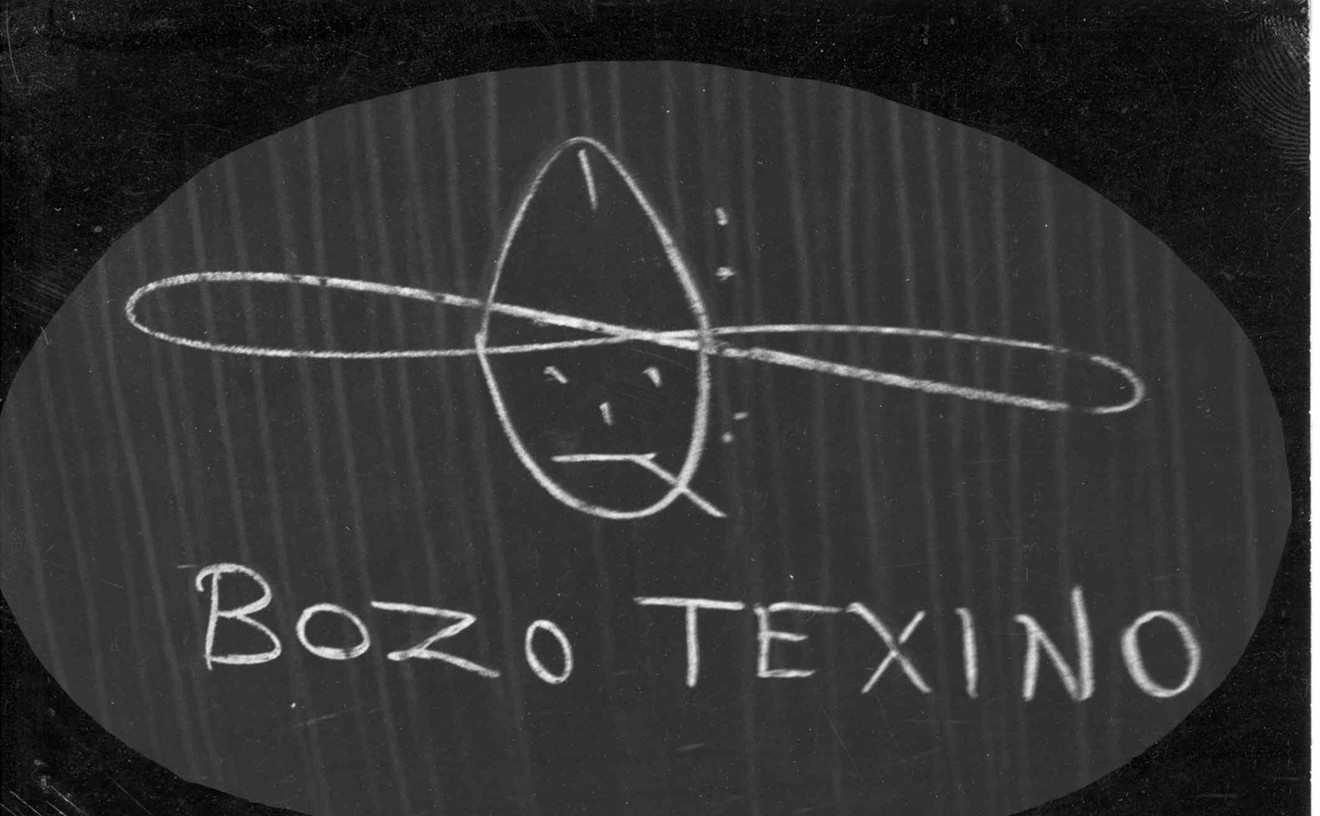The independent comedy Man Camp blows two common misconceptions out of the water: one, that dads are larger than life, and two, that so is Hollywood.
Daniel Cummings and Scott Kruse, the writers and stars of Man Camp, joke that making the movie was a way for them to explore their mutual feeling that they are "man-children." The film doesn't disguise this, pulling out all the usual stops, like hot-wife jokes, unsettling mustaches and a cringe-worthy intimacy talk between a mother and her grown sons.
But on a deeper level, Man Camp also gets at the idea that there are people — often parents — who exist on a pedestal.
Cummings says that he and Kruse "both have these dads who are larger-than-life figures, and we were talking about how we definitely don't feel like we're that, or anywhere near that."
And what does that mean? "Either we'll never be what that is, or we're perceiving something that's not quite fully reality," Cummings admits. "We're looking at our dads with little kid eyes. So we wrote this script about this family that's stuck in arrested development, and created some things that could force them to move forward."
At first, it's easy to dismiss Man Camp as yet another bro comedy about three dysfunctional brothers who are senselessly tormenting their mother's fiancé. But the film ends on a note that resonates, looking at the moment when someone you love is knocked down from God-like status.
But it's not just that prickly reality that Man Camp confronts. In making the movie, the filmmakers face the misconception that Hollywood is the best place to produce a film.
"We'd all spent quite a bit of time in L.A.," Kruse says, "but we just communally have an affinity for Colorado and would love to try and grow this film industry."
"I moved back here to Denver from L.A. in 2016," Cummings says. "I really want to be making films for a long time, but I also really love Colorado and want to live here."
This sentiment has been gaining force in Colorado's filmmaking community, and, more recently, among lawmakers, too.
On March 6, representatives Leslie Herod, Daneya Esgar and Nancy Todd introduced HB 20-1354, proposing a transferrable tax credit that would bolster film in Colorado.
"The thing that most of us fixate on, which I think is extremely important, is funding for tax rebates, tax credits," Cummings says. "Most states with a healthy amount of production have tax incentives somewhere between $10 million and $50 million in a year." As for Colorado, the incentive "has always been on the budget, so it's voted on," he notes, but what the community is "trying to do now is introduce a bill so that these tax credits are actually introduced into law, so they're not something we have to worry about being defunded every year."
Advocates hope that this would keep more filmmakers in state, as well as create a draw for large, out-of-state productions.
"There's a trajectory that most people in our industry take, which is, you get some chops working on smaller productions and some commercial stuff here in Denver," Cummings explains. "But then, if you want to work regularly, you have to move."
For Man Camp, the situation was different: "When you're producing your own stuff, you can do it wherever you want," he says.
That was part of the experiment with Man Camp, to see if there was a sustainable business model for making independent, full-length films in Colorado. "I think there is," Cummings says. "And I think it's going to grow as other infrastructure comes together. But for a small movie like this, we really wanted to do it in our own back yard, in a place that we love to be — and hopefully prove that we can do it over and over again."
The cast and crew of Man Camp believe that the main obstacle independent filmmakers face is letting oversized dreams paralyze a production. "It's a very real temptation to want to overestimate what you need to make a good film," Kruse says. "I think there's something invaluable about stepping out of your own way of how you think it's supposed to be done or how you think Hollywood does it."
At the beginning, Man Camp producers thought the film would come together in a certain way. "We had an IndieGoGo, we had a whole pitch deck ready to go, and we were ready to pitch this thing," Cummings says. "We could not get a meeting with a serious film investor to save our lives."
It turns out that funding for first-time filmmakers is a catch-22, a "Show us what you've done so we know what you're worth" situation," explains Cummings. So they went back to the drawing board.
At that point, Cummings attended a weekend workshop led by Colorado filmmaker Diane Bell, whose first feature, Obselidia, premiered at Sundance. As Cummings describes the idea behind the workshop, "You already have access to everything you need to make a film. You just can't be afraid to ask for it."
He left with the understanding that "you have enough people in your life who believe in you creatively, but you have to stop thinking the money's going to come from 'out there.'" And for Man Camp, that ended up being correct.
"The film was totally funded by friends and family, investing because they believe in us as artists," Cummings notes, "They're not hedge-fund managers. They're normal people that believe in you. You just have to put yourself out there and believe in what you're doing."
Once the money has been raised and the film produced, the success of an independent project comes down to audience engagement. "That's sort of the blessing and the curse of being an independent filmmaker right now," Cummings says. On the one hand, the algorithms that push content on streaming platforms and social media are a known evil. "You can take advantage of those systems in a way that maybe wasn't accessible before everything had to go through a studio," he says.
But on the other hand, "You can also get buried by those systems if you don't really make a push for that engagement."
For anyone with an interest in independent film, Cummings and Kruse say that the best way to support those movies is to show up and speak out. From word-of-mouth recommendations to posts on social media, each share and each view will benefit the filmmakers. Even taking a moment to give the film a star rating can help to get it in front of a wider audience.
If there's a film you really want to support, "rent it the day it comes out," Cummings says.
"We get caught up, like, 'If we could just get approved for this incentive,' or 'If we could just get a meeting with this investor' or 'If we could just get this actor,'" he notes. But in the end, "you just have to say, 'Are you in or out? Because we're going.' And there's a lot of magic that happens when you just decide that you're going somewhere."
Pre-order Man Camp for $12.99 on Apple Music, and stream the film starting on April 21. For a conversation with the cast and crew, visit the Man Camp Facebook page at 8 p.m. on Tuesday, April 21.
[
{
"name": "Air - MediumRectangle - Inline Content - Mobile Display Size",
"component": "12017618",
"insertPoint": "2",
"requiredCountToDisplay": "2"
},{
"name": "Editor Picks",
"component": "17242653",
"insertPoint": "4",
"requiredCountToDisplay": "1"
},{
"name": "Inline Links",
"component": "18838239",
"insertPoint": "8th",
"startingPoint": 8,
"requiredCountToDisplay": "7",
"maxInsertions": 25
},{
"name": "Air - MediumRectangle - Combo - Inline Content",
"component": "17261320",
"insertPoint": "8th",
"startingPoint": 8,
"requiredCountToDisplay": "7",
"maxInsertions": 25
},{
"name": "Inline Links",
"component": "18838239",
"insertPoint": "8th",
"startingPoint": 12,
"requiredCountToDisplay": "11",
"maxInsertions": 25
},{
"name": "Air - Leaderboard Tower - Combo - Inline Content",
"component": "17261321",
"insertPoint": "8th",
"startingPoint": 12,
"requiredCountToDisplay": "11",
"maxInsertions": 25
}
]













